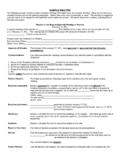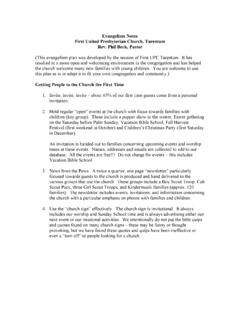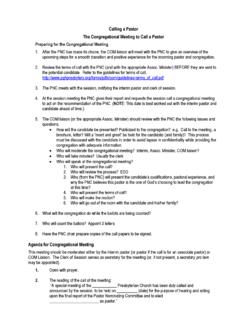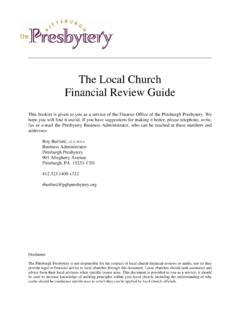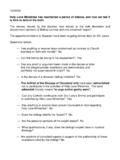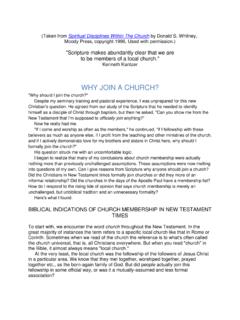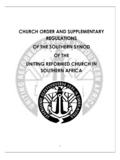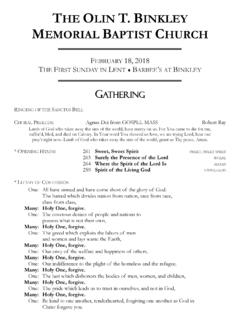Transcription of Being a Presbyterian Officer - Sheldon Sorge
1 Being a Presbyterian OfficerBeing a Presbyterian OfficerBeing a Presbyterian OfficerBeing a Presbyterian Officer THE CONSTITUTION OF THE Presbyterian CHURCH (USA) PART I: The Book of Confessions Contents 1. The Nicene Creed 2. The Apostles Creed 3. The Scots Confession 4. The Heidelberg Catechism 5. The Second Helvetic Confession 6. The Westminster Confession of Faith 7. The Shorter Catechism 8. The Larger Catechism 9. The Theological Declaration of Barmen 10. The Confession of 1967 11. A Brief Statement of Faith Presbyterian Church ( ) Essential Tenets of the Reformed Tradition Universal Trinity: One God in Three Persons Jesus Christ is God and Human Protestant Salvation by Grace through Faith Scriptural Authority Reformed The Sovereignty of God (Love) Salvation & Service (Election) Covenant Community (Ordered) Stewardship of Creation (Gifts) Falleness of Humanity (Idolatry) Transformation (Word & Spirit) PART II: The Book of Order G - Form of Government W - Directory for Worship D - Rules of Discipline EXCERPTS FROM THE BOOK OF ORDER ON ORDAINED OFFICERS CHAPTER XIV ORDINATION, CERTIFICATION, AND COMMISSIONING 1.
2 Ordination for Church Office The persons elected by the church to service in the offices of the church ( ) shall be ordained to these offices by the church. Ordination is the act by which the church sets apart persons to be presbyters (ministers of the Word and Sacrament or elders) or deacons, and is accompanied with prayer and the laying on of hands. Ordination to the office of minister of the Word and Sacrament is an act of the presbytery. Ordination to the offices of elder and deacon is an act of the session, except in the case of the organization of a new church. ( ) Other persons called to perform special services in the church or in the world may be commissioned by the appropriate governing body of the church through a service of dedication.
3 The purpose and pattern of leadership in the church in all its forms of ministry shall be understood not in terms of power but of service, after the manner of the servant ministry of Jesus Christ. CHAPTER VI THE CHURCH AND ITS OFFICERS 1. Offices of Ministry All ministry in the Church is a gift from Jesus Christ. Members and officers alike serve mutually under the mandate of Christ who is the chief minister of all. His ministry is the basis of all ministries; the standard for all offices is the pattern of the one who came not to be served but to serve. (Matt. 20:28) One responsibility of membership in the church is the election of officers who are ordained to fulfill particular functions.
4 The existence of these offices in no way diminishes the importance of the commitment of all members to the total ministry of the church. These ordained officers differ from other members in function only. The Church offices mentioned in the New Testament which this church has maintained include those of presbyters (ministers of the Word and Sacrament and elders and deacons. While the ministry is one, specific forms of ministry may emphasize special tasks and skills and the ordering of the offices of ministry shall reflect this variety. There may be forms of ministry in which primary emphasis is given to proclamation of the Word and the celebration of the Sacraments, forms that stress deeds of love and mercy, forms that are primarily educational, administrative, legislative, or judicial, and forms that are primarily prophetic.)
5 Both men and women shall be eligible to hold church offices. When women and men, by God s providence and gracious gifts, are called by the church to undertake particular forms of ministry, the church shall help them to interpret their call and to be sensitive to the judgments and needs of others. As persons discover the forms of ministry to which they are called, and as they are called to new forms, they and the church shall pray for the presence and guidance of the Holy Spirit upon them and upon the mission of the Church. a. To those called to exercise special functions in the church - deacons, elders, and ministers of the Word and Sacrament God gives suitable gifts for their various duties.
6 In addition to possessing the necessary gifts and abilities, natural and acquired, those who undertake particular ministries should be persons of strong faith, dedicated discipleship, and love of Jesus Christ as Savior and Lord. Their manner of life should be a demonstration of the Christian gospel in the church and in the world. They must have the approval of God s people and the concurring judgment of a governing body of the church. b. Those who are called to office in the church are to lead a life in obedience to Scripture and in conformity to the historic confessional standards of the church. Among these standards is the requirement to live either in fidelity within the covenant of marriage between a man and a woman ( ), or chastity in singleness.
7 Persons refusing to repent of any self- acknowledged practice which the confessions call sin shall not be ordained and/or installed as deacons, elders, or ministers of the Word and Sacrament. The government of this church is representative, and the right of God s people to elect their officers is inalienable. Therefore, no person can be placed in any permanent office in a congregation or governing body of the church except by election of that body. a. It is necessary to the integrity and health of the church that the persons who serve in it as officers shall adhere to the essentials of the Reformed faith and polity as expressed in The Book of Confessions and the Form of Government.
8 So far as may be possible without serious departure from these standards, without infringing on the rights and views of others, and without obstructing the constitutional governance of the church, freedom of conscience with respect to the interpretation of Scripture is to be maintained. b. It is to be recognized, however, that in becoming a candidate or Officer of the Presbyterian Church ( ) one chooses to exercise freedom of conscience within certain bounds. His or her conscience is captive to the Word of God as interpreted in the standards of the church so long as he or she continues to seek or hold office in that body. The decision as to whether a person has departed from essentials of Reformed faith and polity is made initially by the individual concerned but ultimately becomes the responsibility of the governing body in which he or she serves.
9 ( ; )1 1 Very early in the history of the Presbyterian Church in the United States of America, even before the General Assembly was established, the plan of reunion of the Synod of New York and Philadelphia contained the following sentences: That when any matter is determined by a major vote, every member shall either actively concur with or passively submit to such determination; or if his conscience permit him to do neither, he shall, after sufficient liberty modestly to reason and remonstrate, peaceably withdraw from our communion without attempting to make any schism. Provided always that this shall be understood to extend only to such determination as the body shall judge indispensable in doctrine or Presbyterian government.
10 (Hist. Dig. (P) p. 1310.) (Plan of Union of 1758, par. II.) ORDINATION VOWS FOR OFFICERS The minister shall ask those preparing to be ordained or installed to stand before the congregation and to answer the following questions: a. Do you trust in Jesus Christ your Savior, acknowledge him Lord of all and Head of the Church, and through him believe in one God, Father, Son, and Holy Spirit? b. Do you accept the Scriptures of the Old and New Testaments to be, by the Holy Spirit, the unique and authoritative witness to Jesus Christ in the Church universal, and God s Word to you? c. Do you sincerely receive and adopt the essential tenets of the Reformed faith as expressed in the confessions of our church as authentic and reliable expositions of what Scripture leads us to believe and do, and will you be instructed and led by those confessions as you lead the people of God?
